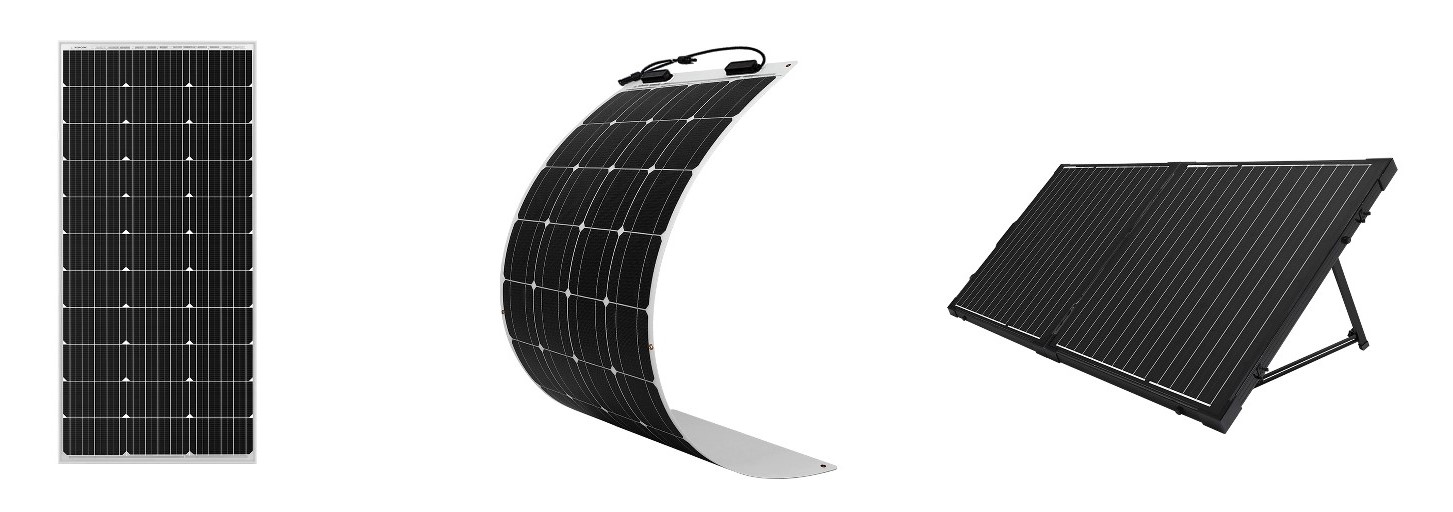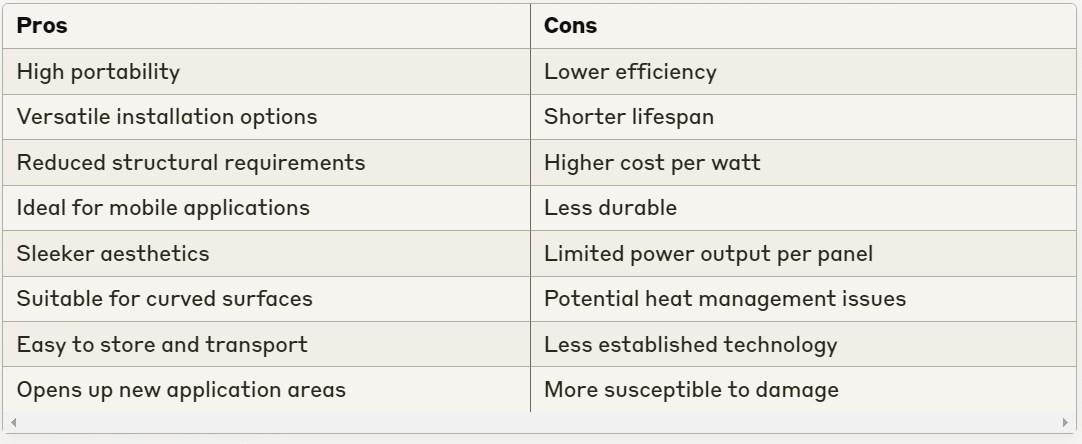Lightweight Solar Panels: What You Need to Know
If you're environmentally conscious and looking to reduce your carbon footprint, you've likely considered solar panels. While traditional solar panels have been around for decades, solar technology continues to advance.
Enter lightweight solar panels – an exciting innovation in renewable energy. These panels offer the same power-generating capabilities as their conventional counterparts but at a fraction of the weight. This breakthrough opens up a world of possibilities, from portable chargers for outdoor enthusiasts to flexible panels that can be integrated into building materials. Thanks to cutting-edge photovoltaic technology, these featherweight wonders often match or exceed the efficiency of standard models.
Whether you're a homeowner wanting to go green or a business owner exploring innovative energy solutions, lightweight solar panels might just be perfect for your needs, offering a versatile and accessible path to a sustainable future.
What are lightweight solar panels and how do they work?
Lightweight solar panels are innovative photovoltaic devices that generate electricity from sunlight, just like traditional solar panels, but with a significant reduction in weight. While a conventional solar panel might weigh around 40 pounds, a lightweight panel of similar size could weigh as little as 10 pounds or even less.
These featherweight power generators achieve their reduced mass through the use of advanced materials. Instead of glass, they often utilize thin, flexible substrates made from advanced polymers or ultra-thin glass. The solar cells themselves are typically made from thin-film technologies such as amorphous silicon, cadmium telluride, or copper indium gallium selenide (CIGS).
Despite their lighter construction, lightweight solar panels operate on the same fundamental principles as their heavier counterparts. When sunlight hits the panel, the photovoltaic cells absorb light particles (photons). These photons excite electrons in the solar cell material, causing them to flow and generate an electric current. The cell's design creates a voltage difference, and the combination of current and voltage results in usable electrical power.
Because of advances in photovoltaic technology, many lightweight solar panels may attain efficiency rates close to, if not exceeding, those of conventional panels. Some high-end lightweight panels have efficiency rates of above 20%, turning more than a fifth of the sunshine they absorb into power.
Types of lightweight panels

As solar technology advances, various types of lightweight solar panels have emerged, each with unique characteristics and applications. Let's explore five common types you're likely to encounter in the market:
Thin-Film solar panels
Thin-film panels are lightweight, made by depositing thin layers of photovoltaic material onto a substrate. Types include amorphous silicon (a-Si), cadmium telluride (CdTe), and copper indium gallium selenide (CIGS). These panels are ideal for portable applications or curved surfaces due to their lightness and flexibility. While traditionally less efficient than crystalline silicon panels, their efficiency is improving with technology advancements.
Flexible solar panels
Flexible solar panels, a subset of thin-film technology, are designed for bendability. Made with amorphous silicon or CIGS, they conform to curved surfaces, making them perfect for boats, RVs, or uniquely shaped roofs. They offer extreme flexibility and lightweight but have slightly lower efficiency compared to rigid panels.
Monocrystalline silicon panels
Some lightweight versions of monocrystalline panels use thinner silicon wafers and lighter framing materials, balancing high efficiency with reduced weight. These panels are suitable for residential and commercial rooftop installations where weight is a concern.
Polycrystalline silicon panels
Lightweight versions of polycrystalline panels offer a balance between cost and efficiency, with reduced weight compared to traditional models. They are often less expensive but slightly less efficient than monocrystalline panels, making them a good option for budget-conscious consumers who need to consider weight restrictions.
Organic photovoltaic (OPV) panels
OPV panels use conductive organic polymers or small molecules for light absorption and charge transport. Ultra-lightweight and flexible, they are suitable for integration into various materials and products. Although currently less efficient than inorganic counterparts, OPV technology is rapidly advancing and holds promise for low-cost, high-volume production in portable electronics and building-integrated photovoltaics.
Advantages and disadvantages of lightweight solar panels

Advantages of lightweight solar panels
- Easy Installation: Lightweight solar panels are easier to handle and install than traditional panels. Their reduced weight minimizes the need for heavy-duty mounting systems, making installation quicker and less labor-intensive, leading to lower costs and less structural stress on roofs.
- Versatility: These panels can be installed on various surfaces, including those that can't support heavier panels. Flexible panels, like thin-film or OPV, can be integrated into curved surfaces, mobile applications, and building facades, expanding solar energy usage beyond conventional rooftops.
- Portability: The lightweight nature of these panels makes them ideal for portable applications. They can be easily transported and set up in remote locations, making them perfect for camping, outdoor activities, and emergencies.
- Reduced Structural Load: Lightweight panels eliminate the need for structural reinforcement, allowing more buildings to adopt solar energy without expensive modifications, especially beneficial for older buildings with limited load-bearing capacity.
Disadvantages of lightweight solar panels
- Lower Efficiency: Lightweight panels typically convert less sunlight into electricity, requiring more panels and space to generate the same amount of power.
- Shorter Lifespan: Factors like environmental exposure and material degradation can shorten the operational lifespan of lightweight panels, leading to higher replacement and maintenance costs.
- Higher Initial Costs: The initial cost per watt for lightweight panels can be higher due to the advanced materials and emerging technologies used.
- Limited Availability: Some advanced lightweight technologies are still in the developmental stages, making sourcing and installation challenging in areas without specialized suppliers.
Lightweight vs standard solar panels: which is better
The most crucial difference between lightweight and standard solar panels lies in their intended use and installation scenarios. Lightweight panels excel in portability and flexibility, while standard panels are superior in efficiency and durability.
Choose lightweight solar panels if:
- You need a portable or temporary power solution
- You're installing on a weight-sensitive structure (e.g., RVs, boats, or older roofs)
- You require panels that can conform to curved or irregular surfaces
Opt for standard solar panels if:
- You're planning a permanent installation with maximum power output
- Long-term durability is a priority
- You have ample space and sturdy mounting options
Other factors like cost, efficiency, and lifespan also differ between the two types. Standard panels generally offer better efficiency and longer lifespans, while lightweight panels might have higher costs per watt but offer unique installation possibilities.
For most permanent home installations, standard panels are typically the go-to choice, while lightweight panels shine in mobile and flexible applications.
Application of lightweight solar panels
Because of its light weight and flexibility, lightweight solar panels are useful for a wide range of applications where standard solar panels may not be appropriate.
1. Mobile and recreational uses
These panels are ideal for mobility and recreational applications, including RVs, boats, and camping. Their portability enables users to quickly put them up and harvest solar energy while on the road, offering a dependable power source for excursions and outdoor sports.
2. Residential rooftops with structural limitations
For homes with rooftops that cannot support the weight of traditional panels, lightweight solar panels are a game-changer. Their reduced weight minimizes the risk of roof damage, making solar power accessible even for houses with older or less robust structures. This solution broadens the opportunities for homeowners to adopt renewable energy.
3. Temporary and portable power solutions
Lightweight solar panels are extremely beneficial for temporary or portable electricity. They may be easily deployed for events, emergency circumstances, or temporary installations, providing a dependable source of energy in places where typical arrangements would be inconvenient or inefficient.
4. Off-grid and remote locations
Lightweight panels are an essential power source in off-grid and rural places. Because of their portability and installation simplicity, they are perfect for distributing energy to areas without access to traditional power grids, supporting important services, and increasing quality of life in remote communities.
Best lightweight solar panel
The Renogy 100 Watt 12 Volt Flexible Monocrystalline Solar Panel is the ideal lightweight solar solution. It's perfect for RVs, boats, and load-sensitive buildings since it weighs only 4.2 pounds, which is a fourth of the weight of conventional 100W panels. Its very thin form is ideal for curved surfaces since it can flex up to 248 degrees. Don't let this panel's small weight deceive you; with IP68 and IP67 classifications, it can survive even the most extreme weather. Superior power generation is guaranteed by high-efficiency monocrystalline cells, and its adaptability makes integration with different types of roofs simple. Energize your travels with an ideal combination of mobility, durability, and efficiency.
- Extremely Flexible, Up to 240°.
- Ultra Lightweight and Ultra Thin.
- Unmatched durability against hurricanes and hailstorms.
- Seamless integration with diverse roof shapes and types.
- Effortless mounting eliminates wear and tear.
Conclusion
Lightweight solar panels are transforming our understanding of renewable energy sources. These technologically advanced wonders make solar power more accessible than ever by packing a tremendous punch in a small package. Lightweight solar panels may be useful for a variety of people, including campers who want to power their RV excursions, homeowners with challenging roofs, and tech enthusiasts who are enthralled with the newest environmentally friendly devices. They're about increasing possibilities rather than just losing weight. These pliable, lightweight, and adaptable panels are setting the standard for renewable energy use in the future. Thus, why not reduce the amount of energy you use? With portable solar panels, harness the power of the sun and get involved in the sustainable energy revolution right now!
FAQs about lightweight solar panel
1. Are lightweight solar panels any good?
Lightweight solar panels are excellent for specific applications. They offer unmatched portability and flexibility, making them ideal for RVs, boats, and weight-sensitive structures. While they may have slightly lower efficiency than traditional panels, advancements in technology are closing this gap. For users prioritizing ease of installation and versatility, lightweight solar panels can be a fantastic choice, providing reliable renewable energy in situations where standard panels aren't practical.
2. Are lightweight solar panels worth it?
Lightweight solar panels are worth it for many users, especially those needing portable or flexible power solutions. They're perfect for outdoor enthusiasts, mobile living, and structures with weight limitations. While potentially more expensive upfront, their unique benefits often justify the cost. Consider your specific needs: if portability, easy installation, or unconventional placement are priorities, lightweight panels can offer excellent value, providing clean energy in situations where traditional panels aren't feasible.
3. What is the lifespan of a lightweight solar panel?
The lifespan of lightweight solar panels typically ranges from 15 to 25 years, slightly shorter than traditional panels. Factors like material quality, environmental conditions, and maintenance affect longevity. While they may not last as long as heavier counterparts, advancements in technology are improving durability. Regular care and proper installation can maximize their lifespan. For many applications, especially mobile or temporary setups, this lifespan is more than sufficient to provide valuable, clean energy.











